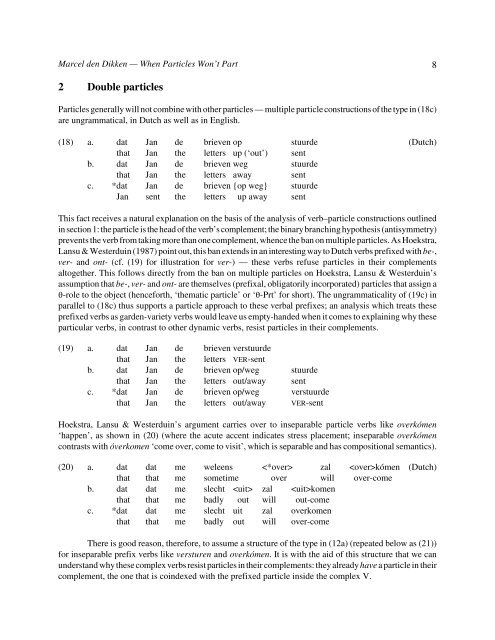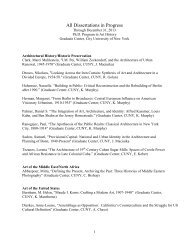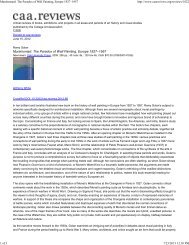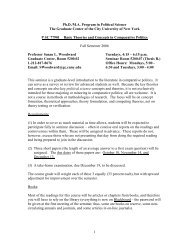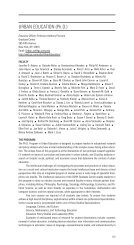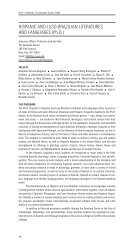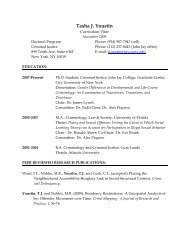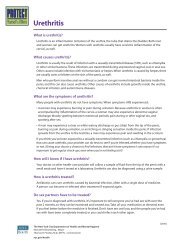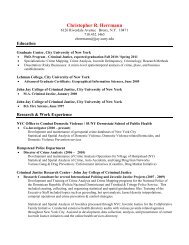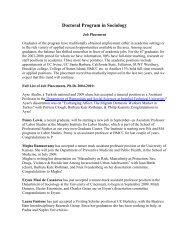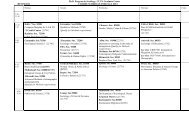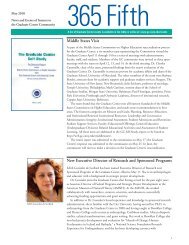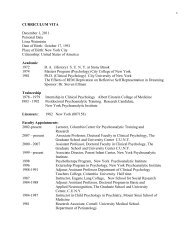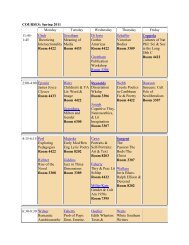When Particles Won't Part - CUNY Graduate Center
When Particles Won't Part - CUNY Graduate Center
When Particles Won't Part - CUNY Graduate Center
You also want an ePaper? Increase the reach of your titles
YUMPU automatically turns print PDFs into web optimized ePapers that Google loves.
Marcel den Dikken — <strong>When</strong> <strong><strong>Part</strong>icles</strong> Won’t <strong>Part</strong><br />
2 Double particles<br />
<strong><strong>Part</strong>icles</strong> generally will not combine with other particles — multiple particle constructions of the type in (18c)<br />
are ungrammatical, in Dutch as well as in English.<br />
(18) a. dat Jan de brieven op stuurde (Dutch)<br />
that Jan the letters up (‘out’ ) sent<br />
b. dat Jan de brieven weg stuurde<br />
that Jan the letters away sent<br />
c. *dat Jan de brieven {op weg} stuurde<br />
Jan sent the letters up away sent<br />
This fact receives a natural explanation on the basis of the analysis of verb–particle constructions outlined<br />
in section 1: the particle is the head of the verb’ s complement; the binary branching hypothesis (antisymmetry)<br />
prevents the verb from taking more than one complement, whence the ban on multiple particles. As Hoekstra,<br />
Lansu & Westerduin (1987) point out, this ban extends in an interesting way to Dutch verbs prefixed with be-,<br />
ver- and ont- (cf. (19) for illustration for ver-) — these verbs refuse particles in their complements<br />
altogether. This follows directly from the ban on multiple particles on Hoekstra, Lansu & Westerduin’ s<br />
assumption that be-, ver- and ont- are themselves (prefixal, obligatorily incorporated) particles that assign a<br />
2-role to the object (henceforth, ‘thematic particle’ or ‘2-Prt’ for short). The ungrammaticality of (19c) in<br />
parallel to (18c) thus supports a particle approach to these verbal prefixes; an analysis which treats these<br />
prefixed verbs as garden-variety verbs would leave us empty-handed when it comes to explaining why these<br />
particular verbs, in contrast to other dynamic verbs, resist particles in their complements.<br />
(19) a. dat Jan de brieven verstuurde<br />
that Jan the letters VER-sent<br />
b. dat Jan de brieven op/weg stuurde<br />
that Jan the letters out/away sent<br />
c. *dat Jan de brieven op/weg verstuurde<br />
that Jan the letters out/away VER-sent<br />
Hoekstra, Lansu & Westerduin’ s argument carries over to inseparable particle verbs like overkómen<br />
‘happen’ , as shown in (20) (where the acute accent indicates stress placement; inseparable overkómen<br />
contrasts with óverkomen ‘come over, come to visit’ , which is separable and has compositional semantics).<br />
(20) a. dat dat me weleens zal kómen (Dutch)<br />
that that me sometime over will over-come<br />
b. dat dat me slecht zal komen<br />
that that me badly out will out-come<br />
c. *dat dat me slecht uit zal overkomen<br />
that that me badly out will over-come<br />
There is good reason, therefore, to assume a structure of the type in (12a) (repeated below as (21))<br />
for inseparable prefix verbs like versturen and overkómen. It is with the aid of this structure that we can<br />
understand why these complex verbs resist particles in their complements: they already have a particle in their<br />
complement, the one that is coindexed with the prefixed particle inside the complex V.<br />
8


